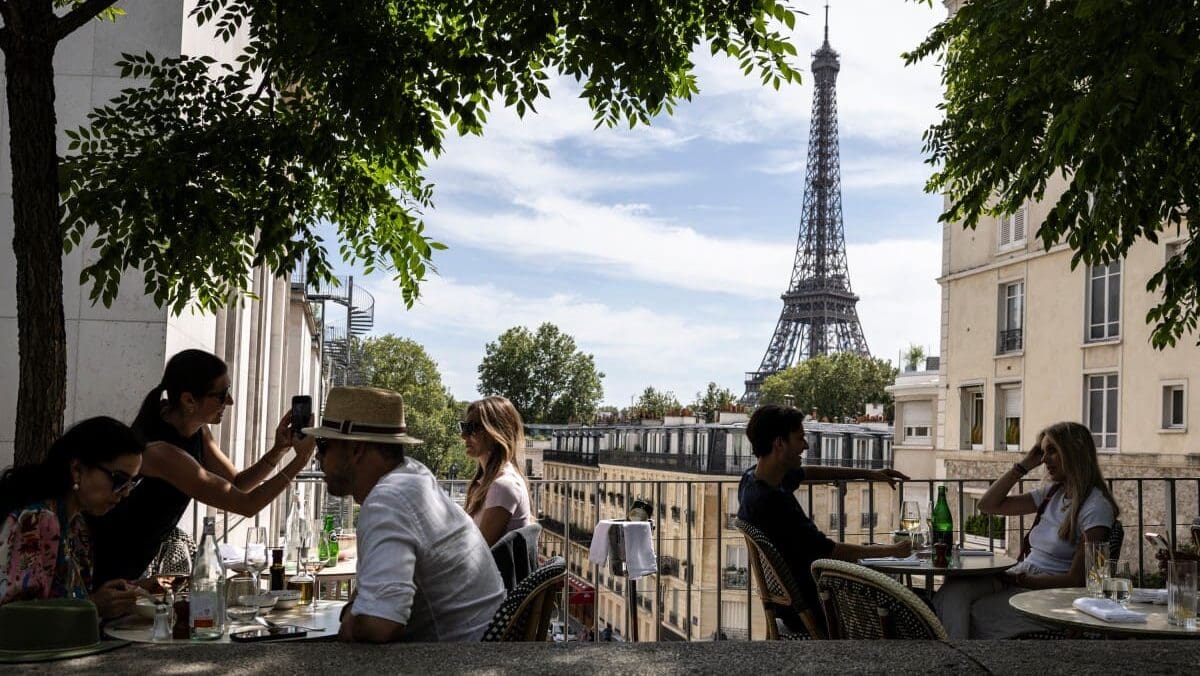
People sit in a restaurant with a view on the Eiffel Tower in Paris on August 4, 2024, during the Paris 2024 Olympics games.
Photo: Olympia DE MAISMONT / AFP
The Paris Olympic Games came to an end on Sunday, August 11th. While they were expected to be a windfall for Parisian retailers, restaurateurs, and hoteliers, who were hoping for a massive influx of customers to boost their sales, the accounts reveal a much more mixed picture. For some, the government is even considering compensation.
“Les hôteliers sourient, les restaurateurs pleurent” (Hoteliers smile, restaurant owners weep) was the headline in Le Parisien the day after the end of the Games. According to the Paris Tourist Office, visitor numbers during the competition were in line with expectations. However, the numbers in terms of profits are not really there.
The official visitor figures were published on Monday, August 12th. The Grand Paris region recorded 11.2 million visitors between July 23rd and August 11th—up 4% on the same period last year. 85% of these tourists were French. Among foreign visitors, the largest contingent came from the United States, followed by Germany and the United Kingdom.
For hoteliers, there was cause for concern a month before the Games, with occupancy rates well below expectations. The prospect of a ‘dark summer’ had many worried. However, the worst-case scenario did not materialise: at the height of the event, bookings soared, including for longer stays—up to ten days for some holidays. “We even exceeded 85% at the top end of the market with official delegations and representatives of major international groups,” explains Frank Delvau, president of the Union des Métiers et des Industries de l’Hôtellerie Paris Île-de-France. However, the head of the sector explains that it is important to be wary of a ‘magnifying glass’ effect: “on the one hand, the establishments in the vicinity of the Olympic sites were full to bursting, but others were neglected.”
Some sectors are looking bleak. The mid-range hotel sector did not achieve the same encouraging results as prestigious establishments. Taxis were still running at 50% empty during the first week of the Games, while passenger cars with drivers, excluded from the priority routes, were little used. As for restaurants, they were far from filling up as they had hoped, particularly the traditional ones in the centre of Paris. Many of them suffered from the traffic problems in the capital. Some of them, close to the security perimeters, were virtually inaccessible or surrounded by fences, making them unattractive. Finally, museum attendance was down. Even iconic sites such as Disneyland Paris failed to fill up.
“We expected to work like crazy … Nothing at all. We fired all our extras and even had to close the kitchens. We’re down to two people in the dining room when there’s usually at least four,” explained the manager of a trendy restaurant in the 19th arrondissement, northeast of Paris, to Le Parisien. A baker in the same district explained that he had worked more even during the pandemic than during the Games.
So the overall picture is one of caution. Because of the many government campaigns urging people in the Paris region to limit their travel, work from home, or even leave the region, very few people were left in the city. So the expected trickle-down of the Games’ appeal to the whole of Paris did not really happen.
The compensation commission—whose creation was announced by the prime minister at the end of June—has already received more than 120 requests from companies claiming to have been adversely affected by the Games. The commission has been announced, but the expected windfall may be a long time coming. Compensation claims will not be able to be lodged on the platform until 2025, and it is not yet known when it will open. To justify a claim for compensation, an establishment will have to provide proof that its drop in turnover “must be the direct consequence of a police measure taken by the State and suffered personally by the claimant professional.” “It will be up to the professional to provide proof by any means of this direct link with the loss suffered by his business,” states the secretary general of the compensation commission. Claims for compensation on the grounds that Parisians were working from home or that the Olympic Games had driven away regular customers will therefore not be admissible.
The late date requested for the submission of claims is explained by the government’s wish to wait for a definitive assessment: a one-off feeling of going through a rough patch does not necessarily justify public aid, and it is possible that a rebound effect will occur at the end of the period of restrictions.
One of the objectives put forward by the Paris mayor for holding the Olympic Games largely in central Paris was to create a windfall effect for professionals in the tourism sector. Once again, it would appear that Anne Hidalgo’s predictions have been thwarted: while Paris seems to have avoided disaster overall, the Olympic Games will not have been a blessed period for consumer spending either.
The most optimistic can console themselves by saying that, in the medium term, the positive images of Paris sent out during the Games can only boost visitor numbers to the French capital in the coming months.
